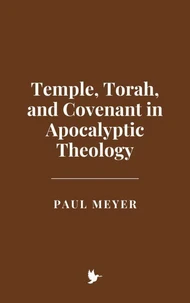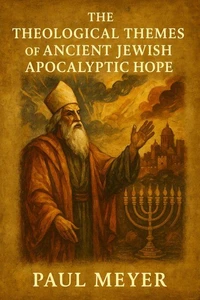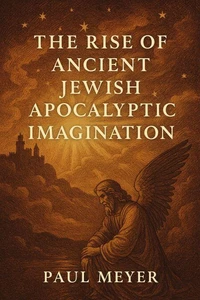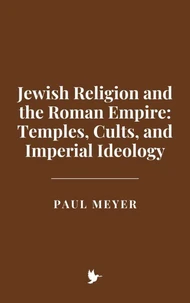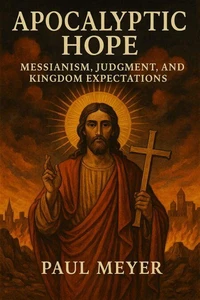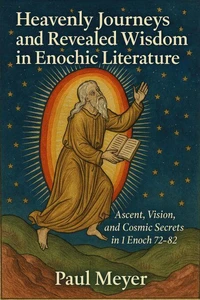Israel and the Foreign Nations in the Book of Isaiah
Par :Formats :
Disponible dans votre compte client Decitre ou Furet du Nord dès validation de votre commande. Le format ePub est :
- Compatible avec une lecture sur My Vivlio (smartphone, tablette, ordinateur)
- Compatible avec une lecture sur liseuses Vivlio
- Pour les liseuses autres que Vivlio, vous devez utiliser le logiciel Adobe Digital Edition. Non compatible avec la lecture sur les liseuses Kindle, Remarkable et Sony
 , qui est-ce ?
, qui est-ce ?Notre partenaire de plateforme de lecture numérique où vous retrouverez l'ensemble de vos ebooks gratuitement
Pour en savoir plus sur nos ebooks, consultez notre aide en ligne ici
- FormatePub
- ISBN8230080008
- EAN9798230080008
- Date de parution01/02/2025
- Protection num.pas de protection
- Infos supplémentairesepub
- ÉditeurIndependently Published
Résumé
The book of Isaiah is a profound and multifaceted work that blends judgment, hope, and the promise of redemption. Positioned within the turbulent historical context of 8th-century BCE Israel, it addresses the looming threats of Assyria and Babylon while navigating the internal moral and spiritual crises of Israel. Central to Isaiah's message is the concept of divine sovereignty, where God is not only the ruler of Israel but of all nations, orchestrating the rise and fall of empires and directing the course of history to fulfill His ultimate purposes.
Through vivid imagery, prophetic actions, and declarations, Isaiah underscores Israel's failure to live up to its covenantal responsibilities, yet simultaneously affirms the hope of restoration through God's grace. Isaiah's vision of redemption extends beyond Israel's immediate restoration to encompass a global scope. His prophecies anticipate a future messianic figure from the line of David, who will establish a reign of justice, peace, and righteousness, bringing both Israel and the nations into a harmonious relationship with God.
The themes of exile and restoration are intricately tied to the theological concept of purification-Israel's suffering serves as a means of spiritual renewal, preparing the people to fulfill their calling as a light to the nations. This vision culminates in the promise that the ultimate triumph of divine justice will bring about not only the restoration of Israel but the reconciliation of all peoples and the renewal of creation itself.
The book of Isaiah offers a dynamic tension between judgment and mercy, sin and redemption, illustrating that God's justice is always tempered by His mercy. It calls Israel-and, by extension, the world-to repentance, while simultaneously offering hope for future salvation. Through a mixture of oracles, vivid symbolic actions, and theological insights, Isaiah's prophecy weaves a comprehensive vision of a world transformed by divine intervention.
This vision remains a cornerstone of both Jewish and Christian eschatology, challenging readers to see beyond the immediate historical context to the broader, cosmic restoration that God will ultimately bring to fruition.
Through vivid imagery, prophetic actions, and declarations, Isaiah underscores Israel's failure to live up to its covenantal responsibilities, yet simultaneously affirms the hope of restoration through God's grace. Isaiah's vision of redemption extends beyond Israel's immediate restoration to encompass a global scope. His prophecies anticipate a future messianic figure from the line of David, who will establish a reign of justice, peace, and righteousness, bringing both Israel and the nations into a harmonious relationship with God.
The themes of exile and restoration are intricately tied to the theological concept of purification-Israel's suffering serves as a means of spiritual renewal, preparing the people to fulfill their calling as a light to the nations. This vision culminates in the promise that the ultimate triumph of divine justice will bring about not only the restoration of Israel but the reconciliation of all peoples and the renewal of creation itself.
The book of Isaiah offers a dynamic tension between judgment and mercy, sin and redemption, illustrating that God's justice is always tempered by His mercy. It calls Israel-and, by extension, the world-to repentance, while simultaneously offering hope for future salvation. Through a mixture of oracles, vivid symbolic actions, and theological insights, Isaiah's prophecy weaves a comprehensive vision of a world transformed by divine intervention.
This vision remains a cornerstone of both Jewish and Christian eschatology, challenging readers to see beyond the immediate historical context to the broader, cosmic restoration that God will ultimately bring to fruition.
The book of Isaiah is a profound and multifaceted work that blends judgment, hope, and the promise of redemption. Positioned within the turbulent historical context of 8th-century BCE Israel, it addresses the looming threats of Assyria and Babylon while navigating the internal moral and spiritual crises of Israel. Central to Isaiah's message is the concept of divine sovereignty, where God is not only the ruler of Israel but of all nations, orchestrating the rise and fall of empires and directing the course of history to fulfill His ultimate purposes.
Through vivid imagery, prophetic actions, and declarations, Isaiah underscores Israel's failure to live up to its covenantal responsibilities, yet simultaneously affirms the hope of restoration through God's grace. Isaiah's vision of redemption extends beyond Israel's immediate restoration to encompass a global scope. His prophecies anticipate a future messianic figure from the line of David, who will establish a reign of justice, peace, and righteousness, bringing both Israel and the nations into a harmonious relationship with God.
The themes of exile and restoration are intricately tied to the theological concept of purification-Israel's suffering serves as a means of spiritual renewal, preparing the people to fulfill their calling as a light to the nations. This vision culminates in the promise that the ultimate triumph of divine justice will bring about not only the restoration of Israel but the reconciliation of all peoples and the renewal of creation itself.
The book of Isaiah offers a dynamic tension between judgment and mercy, sin and redemption, illustrating that God's justice is always tempered by His mercy. It calls Israel-and, by extension, the world-to repentance, while simultaneously offering hope for future salvation. Through a mixture of oracles, vivid symbolic actions, and theological insights, Isaiah's prophecy weaves a comprehensive vision of a world transformed by divine intervention.
This vision remains a cornerstone of both Jewish and Christian eschatology, challenging readers to see beyond the immediate historical context to the broader, cosmic restoration that God will ultimately bring to fruition.
Through vivid imagery, prophetic actions, and declarations, Isaiah underscores Israel's failure to live up to its covenantal responsibilities, yet simultaneously affirms the hope of restoration through God's grace. Isaiah's vision of redemption extends beyond Israel's immediate restoration to encompass a global scope. His prophecies anticipate a future messianic figure from the line of David, who will establish a reign of justice, peace, and righteousness, bringing both Israel and the nations into a harmonious relationship with God.
The themes of exile and restoration are intricately tied to the theological concept of purification-Israel's suffering serves as a means of spiritual renewal, preparing the people to fulfill their calling as a light to the nations. This vision culminates in the promise that the ultimate triumph of divine justice will bring about not only the restoration of Israel but the reconciliation of all peoples and the renewal of creation itself.
The book of Isaiah offers a dynamic tension between judgment and mercy, sin and redemption, illustrating that God's justice is always tempered by His mercy. It calls Israel-and, by extension, the world-to repentance, while simultaneously offering hope for future salvation. Through a mixture of oracles, vivid symbolic actions, and theological insights, Isaiah's prophecy weaves a comprehensive vision of a world transformed by divine intervention.
This vision remains a cornerstone of both Jewish and Christian eschatology, challenging readers to see beyond the immediate historical context to the broader, cosmic restoration that God will ultimately bring to fruition.




